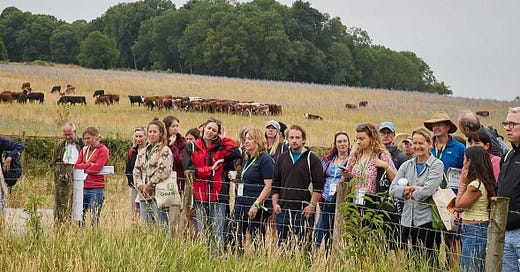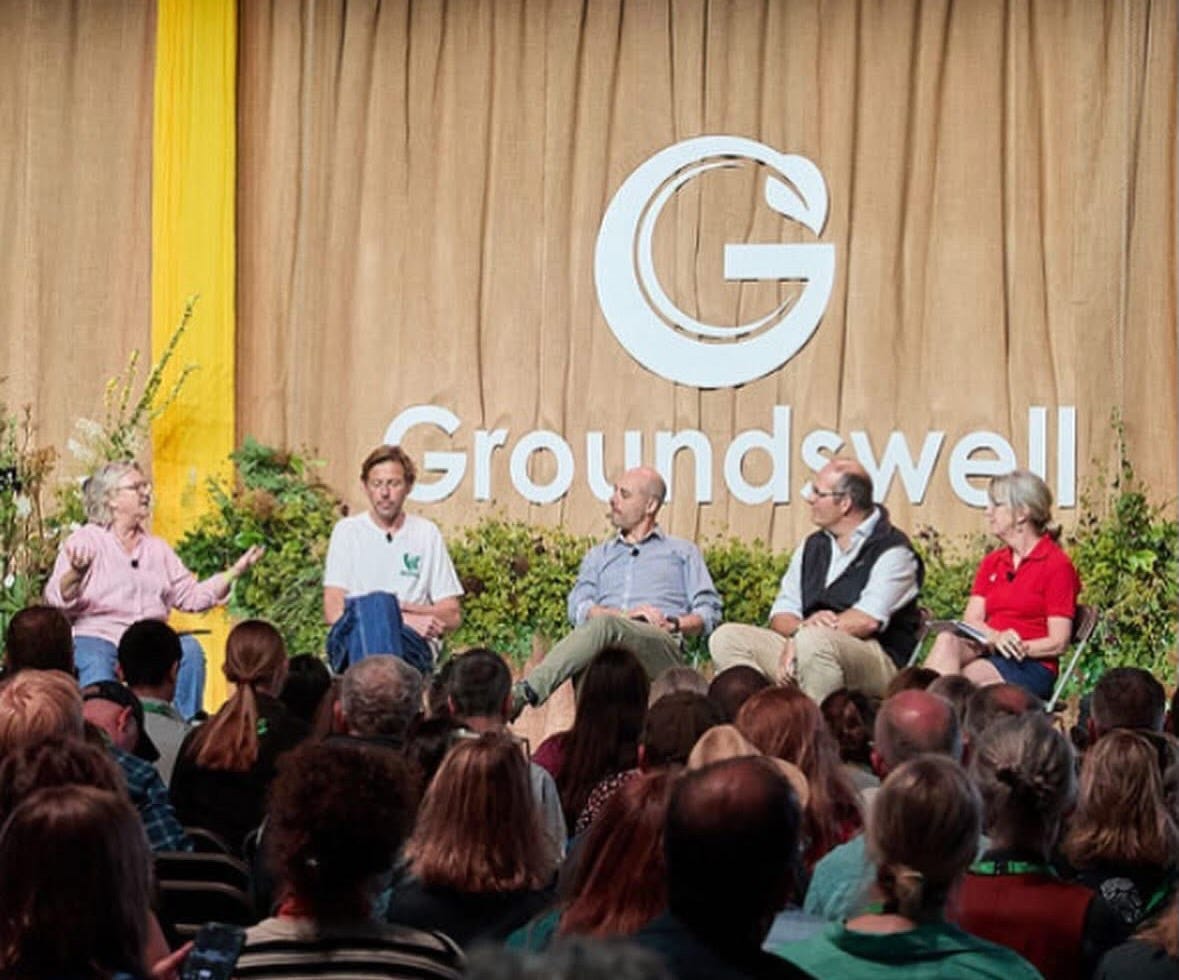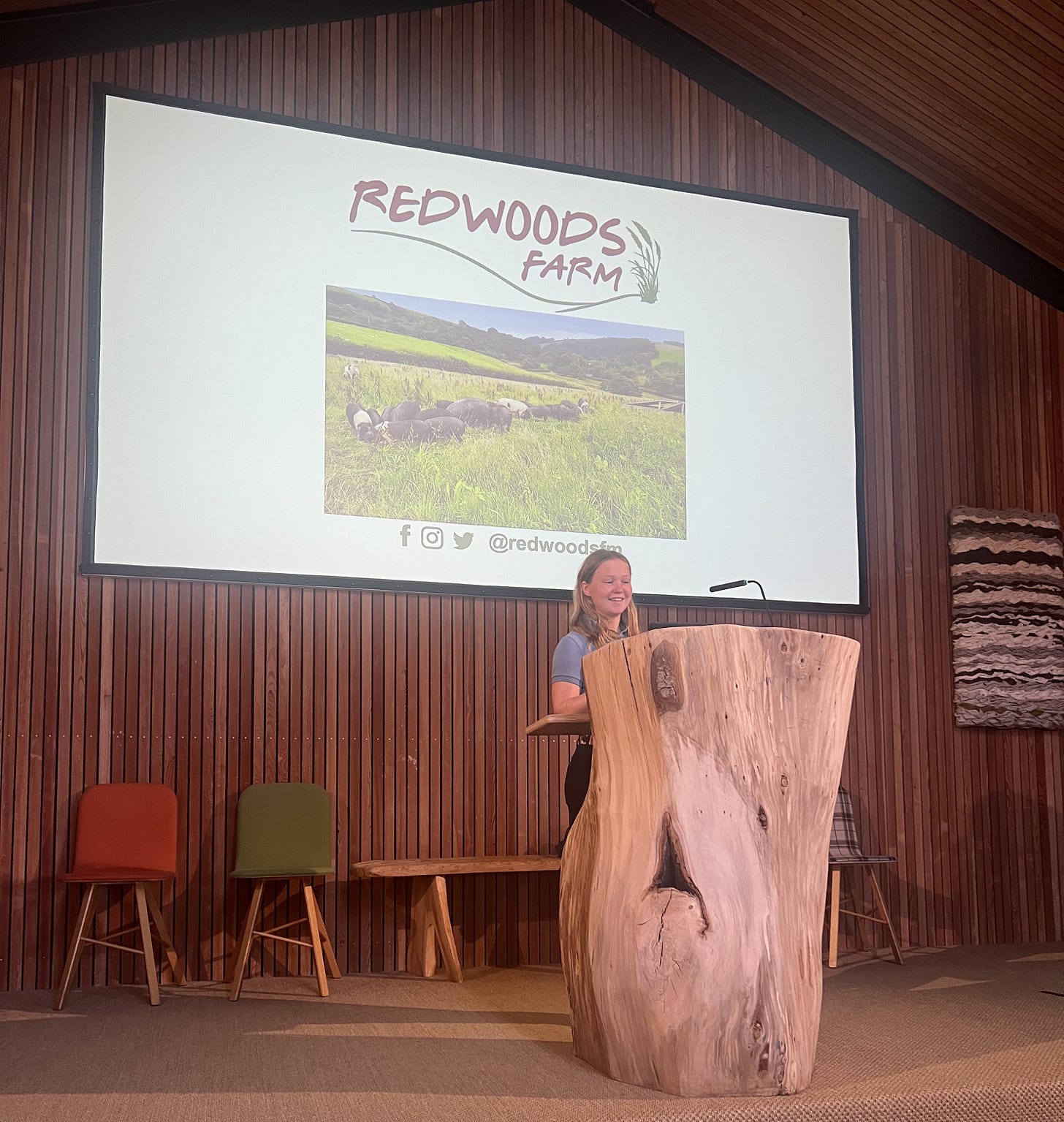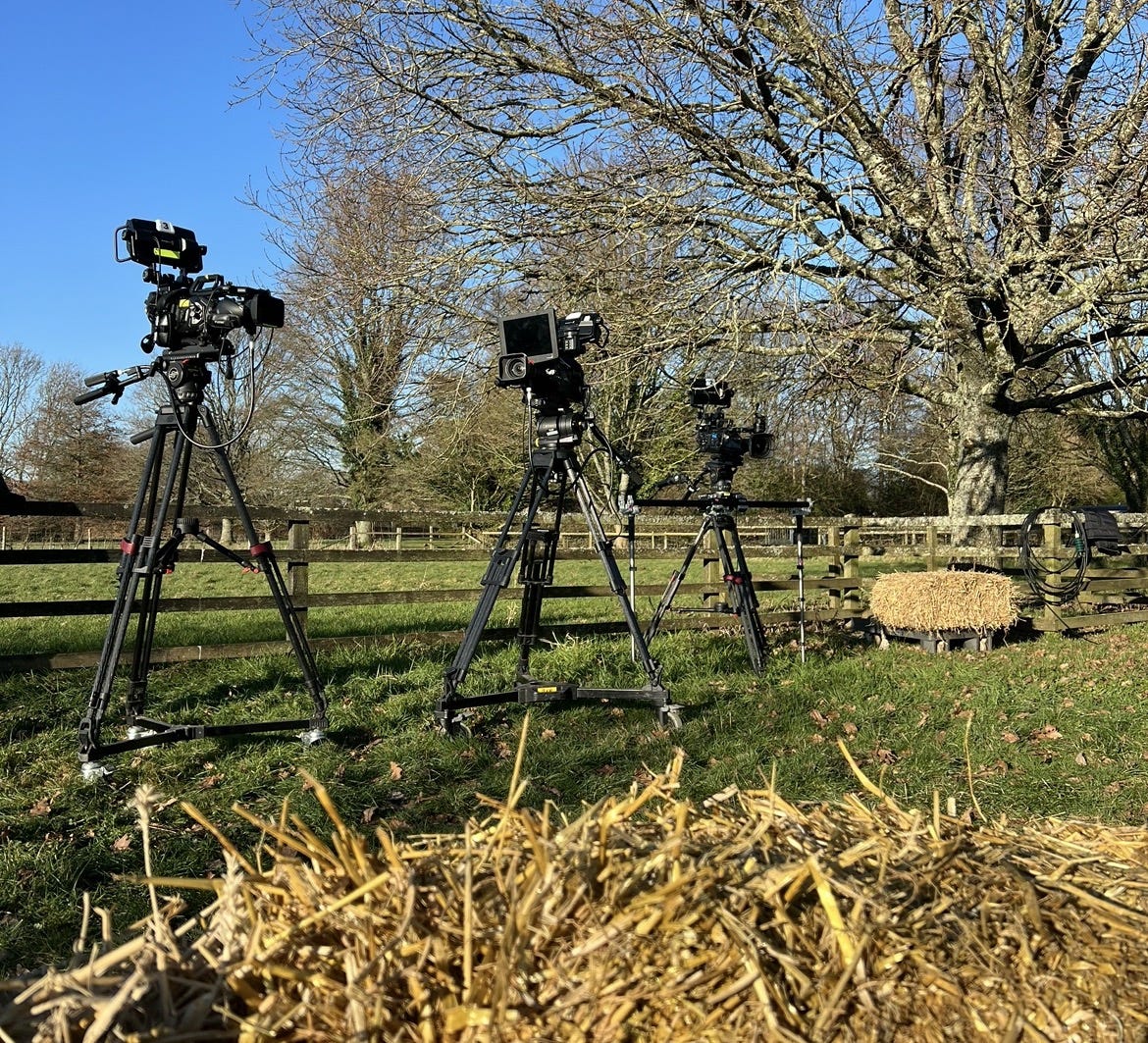This post is part of my “Future of Farming” series, where I dig into the future of agriculture, food security, and policy. If you’re new here, catch up on the rest of the series:
The Future of Farming Education
Feel free to explore each one for a deeper look at where farming is headed!
This week, my social media feeds and WhatsApp chats have been buzzing with photos, quotes, and reflections from Groundswell Festival. I didn’t make it this year (serious FOMO!), but the excitement is impossible to miss.
I’ll admit, seeing everyone’s muddy boots and big grins made me wish I’d just dropped everything and gone. I kept zooming in on photos to see if I recognised a familiar face from last year. It really got me thinking: this festival isn’t just an event, it’s a classroom.
Farming education is changing-fast!
With the pace of change in agriculture-new technologies, shifting subsidies, and evolving public values, we can’t rely on how things have always been done. That includes how we learn.
Learning in the Field: Why Getting Off the Farm Matters
Farming can be isolating, with long stretches working alone. Traditionally, knowledge was passed down through generations or learned at college or university. But the industry can be closed off and not always welcoming to newcomers. That’s why it’s crucial to get off the farm and attend sector events and conferences to share knowledge.
I remember heading off to my first ever farming conference on my own. I dived in and out of sessions, thinking no one would notice me. But so many farmers and individuals reached out and shared knowledge, and by day two, I was making connections at every session I went to.
More and more, the real learning is happening in the field, quite literally. It’s driven by farmers, shared in community, and shaped by a growing belief that a healthy, thriving food system begins with informed, connected people on the land. These people want change, they’re striving for a fairer food system that supports regenerative agriculture and agroecology.
Take Groundswell, for example. Yes, it’s a farming conference but it doesn’t look or feel like one. It’s open-air, filled with demo plots and practical sessions, and designed to spark conversation between farmers of all backgrounds. Whether it’s a hands-on workshop on no-till drills or a panel on policy reform, the emphasis is always on peer-to-peer learning, experimentation, and openness.
Farming in the UK can feel kind of hopeless at the moment. With farmers having to diversify and weather changes in policy and temporary withdrawal of subsidies, it’s easy to feel like you’re pushing water uphill just to survive. Getting off the farm to events like Groundswell or the Oxford Real Farming Conference is honestly the best thing you can do. Immersing yourself with like-minded individuals, experts in agroecology, food justice champions, and inspiring people leaves you feeling totally renewed-buzzing, even.
Honestly, there are days I’ve looked at farming in the UK and just thought, “there’s no money in farming anymore-can we ever make a viable farming business?” But going to an event like the ones I’ve mentioned can totally turn your perspective upside down. I’ve left completely inspired to reinvent myself and my farming methods every time.
Even though I wasn’t there this year, the value of these events is clear. They offer space not just for technical knowledge, but for community-building and new thinking. I’ve had similar experiences at workshops at FarmED and the Oxford Real Farming Conference both left me with new tools, new ideas, and, maybe most importantly, a renewed sense that I wasn’t doing this work alone.
At FarmED, I met a couple who’d just started keeping pigs, at the time we were three years in and had more experience. But they had all the same worries I did in year one. We swapped tips and ended up laughing about our shared disasters with electric fencing. It turns out they were only just down the road from us in Hampshire, and we’d all travelled up to the centre in the Cotswolds.
And it’s not just Groundswell. There are so many great events and communities shaping the new face of farm education; Ark Summit, Fields Good, The Agroforestry Show, LEAF Open Farm Sunday, Pasture for Life events, and more. Each one adds another thread to the wider web of agroecological learning.
Who’s Teaching? New Voices and Farmer-Led Networks
The traditional model of top-down, institution-led agricultural training is giving way to something far more dynamic. Networks like the Landworkers’ Alliance, Emergent Generation, and Roots to Nature are opening the door for diverse voices, young farmers, new entrants, women, and BIPOC communities to lead the conversation.
Mentorship and peer-to-peer learning are now central. People are learning from neighbours, online networks, shared mistakes, and collective wins. Education in this space is more horizontal than hierarchical, and that’s a good thing. It’s refreshing and open-minded. An expert doesn’t have to be a university PhD with no farm experience, they can just be a passionate farmer willing to share their story on a social platform.
Look at me, for example: I never dreamed anyone would subscribe to my newsletter, and here I am, writing my story and trying to champion British farming and over 500 of you are listening. That’s really something. If you’d told me five years ago I’d be writing for hundreds of people, I’d have laughed. I still get nervous hitting ‘publish’.
Digital Access: Learning Anytime, Anywhere
One of the biggest shifts in recent years has been the rise of digital learning. From podcasts like Farmerama Radio and Farm Gate, to webinars hosted by the Soil Association or The Prince’s Countryside Fund, to Instagram reels showing how to set up a rotational grazing system-there’s a wealth of free and accessible knowledge out there.
Educational content has also strengthened the relationship between farmers and consumers. The best example is Jeremy Clarkson, what the media calls the “Clarkson Effect.” Whenever a new season airs on Amazon Prime, there’s a surge in public support for British and local produce. Clarkson wasn’t the first to use his platform for educational content-farmers have been posting livestock rearing, butchery demos, and I even did a video about making our homegrown pig feed.
Filming that pig feed video, I had no idea if anyone would care. Turns out, people love seeing the messy, real side of farming. (Watch it here)
This content shows transparency, and the public has more faith in what they’re purchasing. There’s genuine interest in how food is produced and where it comes from. It’s rare, but once the spark is there, we have to nurture it until it becomes a fire.
Bursaries and scholarships (from groups like the Real Farming Trust or the Organic Research Centre) are making education more affordable. More importantly, this digital wave is breaking down barriers for people who aren’t from traditional farming backgrounds or who don’t have access to land.
What We’re Learning: Shifting the Curriculum
It’s not just how we learn that’s changing, it’s what we’re learning. For a growing movement of people, the focus is moving beyond yield-per-acre and inputs to a much broader, more holistic view of what it means to farm well.
As HRH Prince William said following his visit to Groundswell last week:
“Regenerative farming is not a fringe alternative. It must be a foundation stone for British agriculture to help us rebuild the health of our nation.”
Agroecology. Soil microbiomes. Biodiversity. Food sovereignty. Circular economy models. These aren’t fringe topics anymore they’re at the heart of the new curriculum.
FarmED, Groundswell, Ark Summit, ORFC, and more have led the way, introducing concepts that not only protect land and people, but make long-term business sense too. This isn’t idealism; it’s about building resilience in the face of enormous uncertainty.
A Personal Reflection: Still Learning Every Day
I didn’t go to ag college. I call myself a self-taught farmer, although I learned to farm through a mix of working on the land, asking questions, making mistakes, and turning to others for help. It wasn’t linear. It still isn’t.
We didn’t find our community to ask for help until recently. For the first few years, it was very closed doors. Many of the generational farmers around us didn’t want to help or share their knowledge because they didn’t take us seriously as farmers. But as our herd and farming enterprise grew, doors started opening-but we had to find a way to keep learning and asking questions to improve our system.
There were a LOT of times I felt completely out of my depth, like when one of our first pigs farrowed and she had parvovirus. She birthed two piglets fine, but then laboured for hours with nothing. I didn’t know who to call. Of course, I ended up ringing the vet, but at the time, I just needed someone to tell me I wasn’t overreacting. Turns out, I wasn’t-a round of oxytocin and the vet pulled out five more piglets, all mummified due to the parvovirus. After some antibiotics and rest, the sow was perfectly fine and went on to have healthy litters with no complications.
That’s part of what makes this movement so special: the openness, the generosity, and the fact that we’re all still learning, all the time.
Looking Ahead: What Comes Next?
In five or ten years, I hope we see even more support for farm-based learning. Groundswell has inspired so many new festivals such as Fields Good or the Land Alive Conference. More community farms with training arms. More flexible education for working farmers. More joined-up thinking between policy, education, and real-life practice.
We need to keep breaking down the barriers, whether it’s cost, access to land, or simply not knowing where to start. Because the future of farming depends not just on policy or climate or market shifts, but on people. Informed, skilled, hopeful people who believe change is possible.
Over to You
I’d love to hear from you. What’s been your most valuable learning experience as a farmer, grower, or food activist? Have you found a great course, podcast, or teacher? Let’s share resources and help each other grow.
Drop your favourite learning moment in the comments-or just say hi if you’re new here! I read every message, even if it takes me a day or two to reply.
And if you’d like to read more, stick around. The next posts in this series are "Farming Without Borders" and "Why I Still Believe in Farming."
Join the Community
If you’ve enjoyed this post and want to keep up with the latest on food security, grazing livestock, and the future of farming, I’d love for you to join my newsletter community!
Subscribe for free to get regular updates, stories, and practical insights delivered straight to your inbox.
Or become a paid subscriber to directly support independent, farmer-led writing.
Every subscriber helps keep these conversations going and supports the future of authentic, on-the-ground agricultural storytelling.
Your support-whether it’s a comment, a share, or a paid subscription-means the world to me (and keeps me in coffee and wellies). Thanks for being here.













Definitely doing Groudswell next year. Everyone is there! Completely agree these connections are vital. The ORGC is a fixed date for us, inspiring start to the year. I’m enjoying the Sustainable Food Trust podcast just now